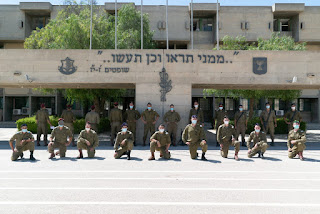BACK TO "GRANDMA'S ARMY"
Israel's management of the coronavirus epidemic is
proving to be one of the most challenging events since the establishment of the
state.
Meanwhile, IDF recruitment continues as usual, as does
combat training, with adjustments made in order to comply with the guidelines
of the Health Ministry. To date, 23 IDF soldiers have contracted the
coronavirus, and 5,600 soldiers are in quarantine, of which 240 are “lone
soldiers.”
With four grandchildren in the IDF, I was interested
to hear from them how the coronavirus impacts on their army service:
Amitai, who is in the Armoured Corps, began an
officer’s course 7 months ago and last week the concluding ceremony was held – for
the first time, with no family or friends with whom to share their celebration.
The course was carried out as always, beginning with the cadets from all of the
ground forces. The subjects they studied were focused mainly on leadership,
ethical values, command and basic warfare.
The coronavirus broke out less than two weeks after the
different corps were returned to their home bases. As a result, every combat unit was segregated
outside the base.
For Amitai it was the hardest period he has experienced since joining the army. Having to distance themselves from the home base plus the feeling of uncertainty contributed to the stressful situation. They had no way of knowing when they could return to their base. Every Shabbat and the whole of Pesach were spent outside in isolation. In spite of the harsh conditions the onus of the training had to be maintained, since they were compelled to finish the course in the normal time.
For Amitai it was the hardest period he has experienced since joining the army. Having to distance themselves from the home base plus the feeling of uncertainty contributed to the stressful situation. They had no way of knowing when they could return to their base. Every Shabbat and the whole of Pesach were spent outside in isolation. In spite of the harsh conditions the onus of the training had to be maintained, since they were compelled to finish the course in the normal time.
Being confined together for so long, the whole
platoon became like one big family and special bonds were formed. There was
always a helping hand where the stronger members supported their weaker fellow
soldiers.
They learned how to command a platoon of tanks – at
night and in daytime, in built-up areas and in the open. They also learned how to
fight jointly with all other ground forces, including the engineering fighting
corps.
As an officer, Amitai will now be commanding a division
of the platoon in the advanced track of the fighter Armoured Corps.
Memi, who is the commander of a unit from a special commando corps, has been in the army for over four years.
From the very beginning of the coronavirus outbreak, every unit was separated
and slept in the training camp outside the base. They saw no-one from the other
units for one and a half months. Every soldier wore a mask and special
multi-use masks were sown for everyone. Now that the virus has become more
severe, they are confined for a longer time to their separate units.
Ohad, who belongs to the same special commando corps, wrote me that
training has been carried on as usual, except for the fact that the units have been completely separated.
Adi is the officer in
charge of 21 female soldier instructors whose job is to train the Armoured
Corps fighters on the working of the tank’s
missiles as well as its communication
system. Apart from supervising the courses in which the instructors are trained, Adi has to take care
of all their needs and is responsible for both their physical and emotional
welfare.
Immediately after the coronavirus
break out, Adi was confined to the base for seven weeks. She didn't have a
moment during that time, as an officer, to take a break from her regular duties
and attending to the wellbeing of her sister soldiers, some of whom found the
enforced "shut-in" very difficult. Plus the cramped conditions and
communal showers, toilets, etc. The hardest for all, including Adi, was being
kept so far away from home, family, and friends.
On the positive side, they also had time
for extracurricular activities which Adi organised into upgrading their
physical fitness with sports, and gymnastics. She also arranged several “fun” evenings for the instructors and the
staff officers – adding to the strengthening of the group.
As the “people’s army,” the IDF is the most significant potential resource available to the State of Israel. It has abundant resources and capabilities; manifests flexible operability; experienced in managing mass emergencies on a national level; and perceived by the Israeli population as its most trustworthy institution.




Comments
Post a Comment